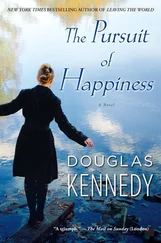'And when you get off the plane in America... ?'
I shrugged.
Ellen gave me a commiserative smile.
'We all have dreams of leaving', she said.
'Even you?'
'Everybody. But what you must try to remember at all times is that you have an illness. Depression isn't a punishment for being a bad little girl. Nor is it a sign of personal weakness. It is an illness - and one from which you will be eventually released. But this is a very serious condition with which you are grappling. So serious that...'
She hesitated for a moment, then said, 'Dr Rodale and I debated whether or not to tell you what I'm about to tell you... but we decided you should hear it from us rather than from anyone around the unit. You remember Agnes Shale who shared the room with you when you first arrived?'
'Has something happened?'
'I'm afraid so. Agnes jumped under an underground train last week and was killed'.
I shut my eyes and said nothing.
'According to her husband, she'd been doing fine for the first week or so. But then, she stopped taking the anti-depressants - because, I gather, they weren't agreeing with her. The sleeplessness started again. But her husband assured us that she was bonding well with her son - and, outwardly anyway, seemed to be coping well with things. Until...'
She reached over and took a sip from a glass of water on the table by her chair.
'Now I want to be absolutely clear about something', she said. 'And it's something that you yourself need to understand. Agnes's suicide cannot be conclusively tied to the fact that she checked herself out of hospital before anyone here believed she was ready to leave. Depression is always an atypical illness - by which I mean that it can never be empirically tracked or second-guessed. So, do believe me, I am not trying to put a "See what happens if you don't listen to us" spin on this story. All I want to emphasize is that we all have to be very vigilant about your condition - because it is still a brittle one. But, given time, you will get better'.
Sandy concurred with this point-of-view when I recounted what happened to Agnes during our telephone call that afternoon.
'Your therapist is right. You definitely don't want to surrender to regression'.
Surrender to regression? My dear sister had been reading far too many self-help books again.
But I did realize that Ellen had been right to tell me the story - that it had a sobering effect, making me prudent about the status of my equilibrium and the slow tempo of recuperation.
So I kept taking the anti-depressants, and I kept talking three times a week to Ellen, and I kept talking to Sandy (who kept threatening to jump on a plane and visit me - but was far too financially strapped to do so). And when Tony had to skip a few visits because of the usual global crises, I was perfectly sanguine. By the end of week four, the crying fits that marked most days had stopped. When I weighed myself I saw that I had regained half the fifteen pounds I'd lost (and that was enough!). Dr Rodale let me give up the sleeping pills, because I was making it through the night without interruption. Every so often - whenever I felt myself edging towards that black fathomless swamp - I seemed able to skirt the edge and re-route myself back to more stable terrain. The urge to plunge into this morass was still present, but there now seemed to be a safety mechanism in place - a fragile fail-safe that kept me away from the precipice... for the moment anyway.
Then, a few days into week five, I woke up one morning and took my pills and ate my breakfast and announced to the nurse on duty that I would like to see Jack. There was no sudden lifting of the cloud that made me make this decision; no rays of sunlight streaming through the previously fogged windows of my brain. Nor did I have a massive born-again revelation about the wonders of motherhood.
I just wanted to see him.
The nurse didn't slap me on the back and say, 'Great news... and about bloody time too, thank God'. She just nodded for me to follow her.
The baby ward had a heavily reinforced steel door, with a substantial lock - a sensible precaution in a psychiatric unit. The nurse punched in a code, then pulled the door open. There were only four babies in residence. Jack was in the first crib. I took a deep steadying breath and looked in.
He'd grown, of course - by a half-foot at least. But what struck me so forcibly - so wonderfully, in fact - was the way he had lost that initial premature, post-delivery amorphous quality, and was now such a distinctive little guy. He was also fast asleep - and though I initially hesitated about picking him up, the nurse gave me an encouraging nod. So, with extreme care, I reached for him and brought him up next to me. Instead of crying, he snuggled his head against mine. I kissed him and smelt that talc-like new-baby smell which was still prevalent all these weeks after his birth. I held him for a very long time.
That evening, I asked Nurse Patterson if Jack could be moved into my room. When Tony arrived that evening, he was genuinely taken aback to see me bottle-feeding Jack.
'Well then...' Tony said.
'Yes', I said. 'Well then indeed'.
Word spread fast about my reunion with Jack. Dr Rodale was all smiles the next afternoon, informing me that 'this was very welcome news indeed', while cautioning me that I still needed to approach each day with a degree of circumspection, and with the understanding that nothing was straightforward when it came to the skewed landscape of depression.
Ellen, meanwhile, tried to get me to concentrate on one salient point. 'Jack will never remember a thing about this entire time'.
'Lucky for him', I said.
'And I think that, once you are fully recovered, you will begin to forgive yourself - even though, from where I sit, there's nothing to forgive'.
They kept me in for another two weeks. It passed quickly - especially as I was now spending my entire waking day with Jack. They moved him to the baby ward every night (as Dr Rodale insisted that I get solid uninterrupted sleep), but brought him back as soon as I was up in the morning - which meant that, when he stirred out of sleep, I was there to change and feed him. Just as he was also by my side until I went to bed at night. I even started to bring him out on my daily walk around the hospital courtyard. With the exception of sleep, the only time that I relinquished his company was during my thrice weekly sessions with Ellen.
'The general feeling is that you're just about ready to go home', she said at the start of week seven. 'The question is: do you think yourself ready?'
I shrugged. 'I have to leave here sometime'.
'Have you talked with your husband about perhaps having some help at home with Jack?'
Actually, it had been Tony himself who had brought up this issue - reminding me that, before I'd entered hospital, he'd found out the name of a child-care agency in Battersea called Annie's Nannies, and perhaps I'd like to now give them a ring. Though I told Ellen that I would be definitely investigating this possibility, there was also a part of me that felt I should try to make a go of looking after Jack myself - that bringing a nanny in would be another indication of my domestic ineptitude... especially as I wasn't working right now, and Jack was still at that stage where he was sleeping for much of the day. So I wrote a note to our cleaner Cha, asking her if she might be able to come in three additional mornings per week and keep an eye on Jack, thereby giving me a short respite from Baby Land. Tony liked this plan - especially as it was going to be around a third the cost of a full-time nanny. Ellen, however, was sceptical.
'If you can afford it, you really should consider constant help', she said. 'You're still not completely out of the woods yet...'
Читать дальше












